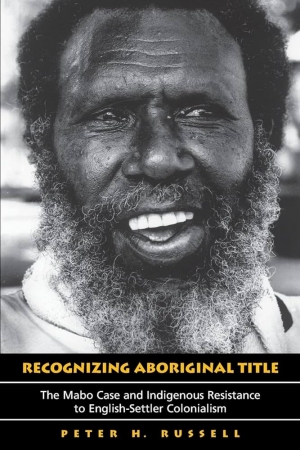Mabo
David Kearns reviews 'Black Lives, White Law: Locked up and locked out in Australia' by Russell Marks
Richard Martin reviews 'Native Title from Mabo to Akiba: A vehicle for change and empowerment?'
Since the passage of the Native Title Act 1993 (Cth) and related law reform, legal rights and interests in a significant and growing estate have been transferred to Aboriginal ...
... (read more)John Bryson reviews 'From Moree to Mabo: The Mary Gaudron Story' by Pamela Burton
Australia’s feisty first female High Court judge
John Bryson
From Moree to Mabo: The Mary Gaudron Story
by Pamela Burton
UWA Publishing, $49.95 pb, 511 pp, 9781742580982
H.V. Evatt, on the hustings during an election campaign, was asked by an eig ...
Tim Rowse reviews ‘Recognizing Aboriginal Title: The Mabo case and Indigenous resistance to English settler colonialism’ by Peter H. Russell
Peter Russell, a distinguished Canadian student of the politics of the judiciary, asks if ‘my people’ – the English settlers of Australia, Canada, New Zealand, and the US – can live honourably. Is their authority defensible against indigenous people’s charge that ‘my people’ bullied them out of their sovereignty? Because European colonial power has been shadowed by a sense of moral unease, interpreting the colonists’ laws matters. ‘There is a lot of leeway in the law,’ Russell observes, ‘and no more so than in legal cultures based on the common law.’ The High Court of Australia’s decisions in Mabo (1992) and Wik (1996) – making native title recognisable to the common law – seemed to Russell to confirm judges’ potential to be the conscience of liberal constitutionalism.
... (read more)Adam Shoemaker reviews 'In the Age of Mabo: History, Aborigines and Australia' edited by Bain Attwood
Some of Australia’s most cogent historical analyses grow out of particular social moments: the close of World War II, the accession (and dismissal) of the Whitlam government, the bicentennial celebrations and protests of 1988. The High Court’s Mabo decision of June 1992 is just such a moment and it is no surprise to find another book which focuses on the aftermath of that landmark decision. Interestingly, In the Age of Mabo is also just as strongly the product of a certain time and political space: the 1991–96 prime ministership of Paul Keating. It is this framework which gives this varied collection of essays its sense of historical occasion; it is also this political underpinning which renders at least one of the contributions nearly obsolete.
... (read more)



